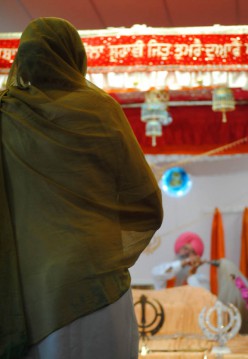
As a mother of three young boys, I spend an inordinate amount of time breaking up fights and trying to help them learn how to interact with each other without squabbling or brawling. Sometimes that learning process requires that each sit alone in a separate room for a while, but as necessary as that may be on occasion, that isolation is not what I want for them in the long term. It may be blissfully quiet for a few minutes, but my boys aren’t learning how to peacefully co-exist or strengthening their relationships with each other while they’re alone in their own rooms.
My most gratifying moments as a parent come when those three sometime-hellions come out of their rooms and play together, help each other, laugh together, work out their differences kindly, and enjoy each other’s company. I imagine our Heavenly Parents feel the same way about us.
“Staying in our own rooms” religion-wise makes life simpler. We’re all busy with full lives, and interfaith work takes time and effort and will most likely involve some uncomfortable restructuring of our worldview. Fewer interfaith interactions may mean less friction, less discomfort, fewer misunderstandings to work through. But at what cost?
The first interfaith experience I remember was a small instance at my friend’s house in, I think, fourth grade. As we sat down to dinner, her mother announced that they’d say grace, so I folded my arms and bowed my head, the standard prayer posture for Latter-day Saints. My friend tapped me on the shoulder and held out her hand. As we prayed holding hands in a circle around the table, my young mind initially reacted with “This is weird!” By the “Amen,” the realization settled that it felt just as right and comfortable as the way I usually prayed.
Since then I’ve been intrigued by others’ faiths and beliefs, and I love to learn all the “virtuous, lovely, or of good report or praiseworthy” aspects of other religions and worldviews. I’ve found common ground in startling places, and in addition to better understanding the beliefs of others, I end up better able to articulate my own beliefs.
I believe that we are brothers and sisters, children of God, and God wants us to get out of our own rooms and learn from each other. I want to get to know my siblings, to learn from them and laugh with them. I want the experience of holy envy that makes me strive to be a better person. It’s hard to “other”-ize friends, people you know. The more exposure we have to other faiths, cultures, ethnicities, and ways of life, the less prone we will be to forget the humanity that exists in all of us, and our responsibility to take care of each other.
When I attended the Faith Feast last spring and set foot in a Sikh gurdwara for the first time, when I listened to a Hindu woman share a story of her childhood at the Interfaith Women’s Circle, when I went to chapel with my son at his Presbyterian preschool, when I listened to music and ate beef brisket at Temple Beth Shalom’s annual Kosher Dinner, I felt a little closer to my siblings of other faiths. We belong to each other and we need to act like it.
Join us for our next Coffee Talk at 10 a.m., Jan. 4 at Indaba Coffee for discussion on the “Challenges and Importance of Interfaith Work in Spokane.” Geddes is a panelist.






